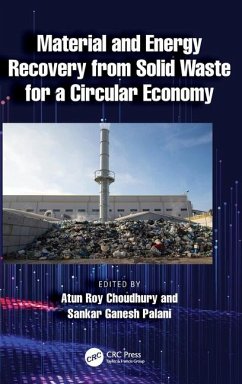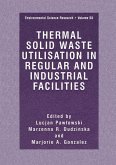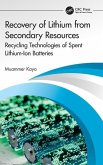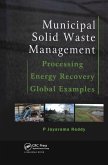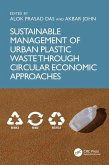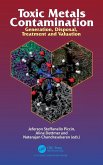Material and Energy Recovery from Solid Waste for a Circular Economy
Herausgeber: Choudhury, Atun Roy; Palani, Sankar Ganesh
Material and Energy Recovery from Solid Waste for a Circular Economy
Herausgeber: Choudhury, Atun Roy; Palani, Sankar Ganesh
- Gebundenes Buch
- Merkliste
- Auf die Merkliste
- Bewerten Bewerten
- Teilen
- Produkt teilen
- Produkterinnerung
- Produkterinnerung
Material and Energy Recovery from Solid Waste for a Circular Economy describes solid waste to material and energy recovery to bridge the gap between theoretical possibilities and on-field criticalities. It includes real-life feasibility analysis and implementation of waste-to-energy systems supported by case studies.
Andere Kunden interessierten sich auch für
![Thermal Solid Waste Utilisation in Regular and Industrial Facilities Thermal Solid Waste Utilisation in Regular and Industrial Facilities]() Lucjan Pawlowski / Marzenna R. Dudzinska / Marjorie A. Gonzales (Hgg.)Thermal Solid Waste Utilisation in Regular and Industrial Facilities81,99 €
Lucjan Pawlowski / Marzenna R. Dudzinska / Marjorie A. Gonzales (Hgg.)Thermal Solid Waste Utilisation in Regular and Industrial Facilities81,99 €![Recovery of Lithium from Secondary Resources Recovery of Lithium from Secondary Resources]() Muammer KayaRecovery of Lithium from Secondary Resources131,99 €
Muammer KayaRecovery of Lithium from Secondary Resources131,99 €![Municipal Solid Waste Management Municipal Solid Waste Management]() P Jayarama ReddyMunicipal Solid Waste Management161,99 €
P Jayarama ReddyMunicipal Solid Waste Management161,99 €![Sustainable Management of Urban Plastic Waste Through Circular Economic Approaches Sustainable Management of Urban Plastic Waste Through Circular Economic Approaches]() Sustainable Management of Urban Plastic Waste Through Circular Economic Approaches197,99 €
Sustainable Management of Urban Plastic Waste Through Circular Economic Approaches197,99 €![Designer Biochar Assisted Bioremediation of Industrial Effluents Designer Biochar Assisted Bioremediation of Industrial Effluents]() Designer Biochar Assisted Bioremediation of Industrial Effluents176,99 €
Designer Biochar Assisted Bioremediation of Industrial Effluents176,99 €![Toxic Metals Contamination Toxic Metals Contamination]() Toxic Metals Contamination198,99 €
Toxic Metals Contamination198,99 €![Process Integration for Resource Conservation Process Integration for Resource Conservation]() Dominic C Y FooProcess Integration for Resource Conservation297,99 €
Dominic C Y FooProcess Integration for Resource Conservation297,99 €-
-
-
Material and Energy Recovery from Solid Waste for a Circular Economy describes solid waste to material and energy recovery to bridge the gap between theoretical possibilities and on-field criticalities. It includes real-life feasibility analysis and implementation of waste-to-energy systems supported by case studies.
Hinweis: Dieser Artikel kann nur an eine deutsche Lieferadresse ausgeliefert werden.
Hinweis: Dieser Artikel kann nur an eine deutsche Lieferadresse ausgeliefert werden.
Produktdetails
- Produktdetails
- Verlag: CRC Press
- Seitenzahl: 376
- Erscheinungstermin: 8. Juli 2024
- Englisch
- Abmessung: 234mm x 156mm x 24mm
- Gewicht: 739g
- ISBN-13: 9781032399768
- ISBN-10: 1032399767
- Artikelnr.: 70149698
- Herstellerkennzeichnung
- Libri GmbH
- Europaallee 1
- 36244 Bad Hersfeld
- gpsr@libri.de
- Verlag: CRC Press
- Seitenzahl: 376
- Erscheinungstermin: 8. Juli 2024
- Englisch
- Abmessung: 234mm x 156mm x 24mm
- Gewicht: 739g
- ISBN-13: 9781032399768
- ISBN-10: 1032399767
- Artikelnr.: 70149698
- Herstellerkennzeichnung
- Libri GmbH
- Europaallee 1
- 36244 Bad Hersfeld
- gpsr@libri.de
Atun Roy Choudhury is an accomplished professional currently serving as Assistant General Manager at Cube Bio Energy Private Limited. With a distinguished career spanning esteemed organizations, he is widely recognized as a leading researcher specializing in waste management and water sanitation. With numerous publications and extensive experience guiding dissertations, Atun enjoys a stellar reputation within the research community. He is a sought-after author, speaker, editor, and reviewer for international scientific platforms. His exceptional contributions have earned him prestigious titles and awards, including a gold medal from the University Grant Commission. Atun's expertise extends to environmental auditing and quality management. His groundbreaking work on microbial waste digestion has garnered global acclaim, being listed in reputable records and endorsed by the United Nations. Prof. Sankar Ganesh Palani is Professor of Environmental Biotechnology at BITS Pilani, Hyderabad Campus. Prof. Ganesh received his PhD in Environmental Science and Engineering from Pondicherry (Central) University, India and had his post-doctoral training at the National Institute of Applied Sciences, Toulouse, France. Prof. Ganesh teaches ecology, environmental science, environmental biotechnology, waste management, sanitation technology, and gene toxicology. His research focuses on waste and wastewater treatment, biomethanation, and biohydrogen production. He has been involved in several projects and has published 2 books, 18 book chapters, and 126 research papers in reputed international and national journals and conference proceedings.
Chapter 1: The 'Greening' of an Australian University: Onsite Composting of
Residential Food Waste
Chapter 2: Evaluating the Bacterial Concrete as a Solution to Construction
Debris Waste
Chapter 3: Sustainable Utilization of Construction and Demolition Waste in
Geotechnical Engineering: A State-of-the-Art Review
Chapter 4: On the Challenge of Recycling Massively Used Polymer-Based
Packaging
Chapter 5: A Comprehensive Techno-Commercial Analysis of Biomedical and
COVID-19 Waste-Related Situation in India: Abetted with a Case Study
Chapter 6: Selective Collection for Optimized Recycling of Waste: Case
Study: The City of Constantine (Algeria)
Chapter 7: Appraising the Natural Bio-Processes over Thermal Treatments to
Treat Municipal Solid Waste: A Step Toward a More Sustainable Environment
Chapter 8: Advancements in the Recovery and Refinement ff Landfill Gas from
Sanitary Landfills
Chapter 9: Bioprocessing of Organic Municipal Solid Waste for Biomethane
and Biohydrogen Production
Chapter 10: Sustainable Biomethanation Process for Energy Recovery from
Faecal Sludge: A Promising Solution for India's Sanitation Challenges
Chapter 11: Regulating Total Soluble Products During Food Waste
Biomethanation for Material and Energy Recovery
Chapter 12: Comparative Life Cycle Assessment and Carbon Footprint Analysis
of Waste Treatment Facilities
Chapter 13: Evaluation of Social Acceptance and Market for Human
Excreta-Derived Products
Chapter 14: Promotion of Circular Economy Through Waste Management Policies
Chapter 15: Integrated Waste Recycling Parks: Bringing Circularity into
Waste Management
Residential Food Waste
Chapter 2: Evaluating the Bacterial Concrete as a Solution to Construction
Debris Waste
Chapter 3: Sustainable Utilization of Construction and Demolition Waste in
Geotechnical Engineering: A State-of-the-Art Review
Chapter 4: On the Challenge of Recycling Massively Used Polymer-Based
Packaging
Chapter 5: A Comprehensive Techno-Commercial Analysis of Biomedical and
COVID-19 Waste-Related Situation in India: Abetted with a Case Study
Chapter 6: Selective Collection for Optimized Recycling of Waste: Case
Study: The City of Constantine (Algeria)
Chapter 7: Appraising the Natural Bio-Processes over Thermal Treatments to
Treat Municipal Solid Waste: A Step Toward a More Sustainable Environment
Chapter 8: Advancements in the Recovery and Refinement ff Landfill Gas from
Sanitary Landfills
Chapter 9: Bioprocessing of Organic Municipal Solid Waste for Biomethane
and Biohydrogen Production
Chapter 10: Sustainable Biomethanation Process for Energy Recovery from
Faecal Sludge: A Promising Solution for India's Sanitation Challenges
Chapter 11: Regulating Total Soluble Products During Food Waste
Biomethanation for Material and Energy Recovery
Chapter 12: Comparative Life Cycle Assessment and Carbon Footprint Analysis
of Waste Treatment Facilities
Chapter 13: Evaluation of Social Acceptance and Market for Human
Excreta-Derived Products
Chapter 14: Promotion of Circular Economy Through Waste Management Policies
Chapter 15: Integrated Waste Recycling Parks: Bringing Circularity into
Waste Management
Chapter 1: The 'Greening' of an Australian University: Onsite Composting of
Residential Food Waste
Chapter 2: Evaluating the Bacterial Concrete as a Solution to Construction
Debris Waste
Chapter 3: Sustainable Utilization of Construction and Demolition Waste in
Geotechnical Engineering: A State-of-the-Art Review
Chapter 4: On the Challenge of Recycling Massively Used Polymer-Based
Packaging
Chapter 5: A Comprehensive Techno-Commercial Analysis of Biomedical and
COVID-19 Waste-Related Situation in India: Abetted with a Case Study
Chapter 6: Selective Collection for Optimized Recycling of Waste: Case
Study: The City of Constantine (Algeria)
Chapter 7: Appraising the Natural Bio-Processes over Thermal Treatments to
Treat Municipal Solid Waste: A Step Toward a More Sustainable Environment
Chapter 8: Advancements in the Recovery and Refinement ff Landfill Gas from
Sanitary Landfills
Chapter 9: Bioprocessing of Organic Municipal Solid Waste for Biomethane
and Biohydrogen Production
Chapter 10: Sustainable Biomethanation Process for Energy Recovery from
Faecal Sludge: A Promising Solution for India's Sanitation Challenges
Chapter 11: Regulating Total Soluble Products During Food Waste
Biomethanation for Material and Energy Recovery
Chapter 12: Comparative Life Cycle Assessment and Carbon Footprint Analysis
of Waste Treatment Facilities
Chapter 13: Evaluation of Social Acceptance and Market for Human
Excreta-Derived Products
Chapter 14: Promotion of Circular Economy Through Waste Management Policies
Chapter 15: Integrated Waste Recycling Parks: Bringing Circularity into
Waste Management
Residential Food Waste
Chapter 2: Evaluating the Bacterial Concrete as a Solution to Construction
Debris Waste
Chapter 3: Sustainable Utilization of Construction and Demolition Waste in
Geotechnical Engineering: A State-of-the-Art Review
Chapter 4: On the Challenge of Recycling Massively Used Polymer-Based
Packaging
Chapter 5: A Comprehensive Techno-Commercial Analysis of Biomedical and
COVID-19 Waste-Related Situation in India: Abetted with a Case Study
Chapter 6: Selective Collection for Optimized Recycling of Waste: Case
Study: The City of Constantine (Algeria)
Chapter 7: Appraising the Natural Bio-Processes over Thermal Treatments to
Treat Municipal Solid Waste: A Step Toward a More Sustainable Environment
Chapter 8: Advancements in the Recovery and Refinement ff Landfill Gas from
Sanitary Landfills
Chapter 9: Bioprocessing of Organic Municipal Solid Waste for Biomethane
and Biohydrogen Production
Chapter 10: Sustainable Biomethanation Process for Energy Recovery from
Faecal Sludge: A Promising Solution for India's Sanitation Challenges
Chapter 11: Regulating Total Soluble Products During Food Waste
Biomethanation for Material and Energy Recovery
Chapter 12: Comparative Life Cycle Assessment and Carbon Footprint Analysis
of Waste Treatment Facilities
Chapter 13: Evaluation of Social Acceptance and Market for Human
Excreta-Derived Products
Chapter 14: Promotion of Circular Economy Through Waste Management Policies
Chapter 15: Integrated Waste Recycling Parks: Bringing Circularity into
Waste Management

